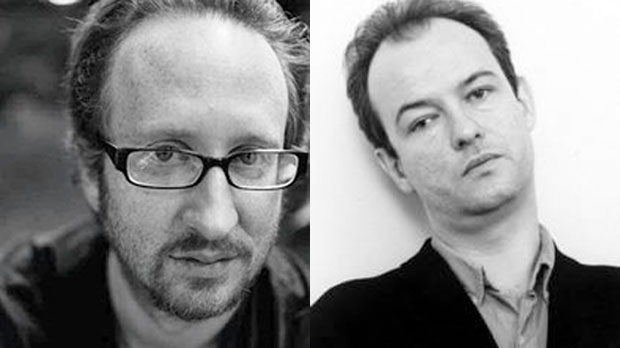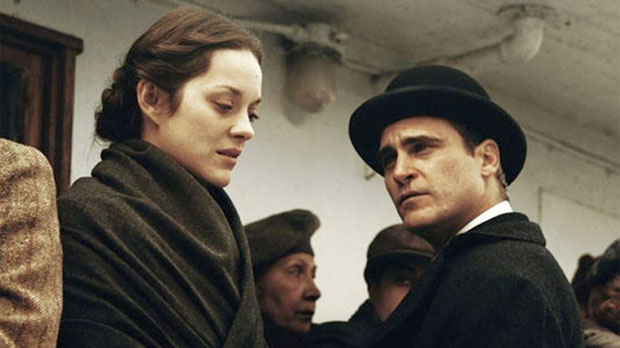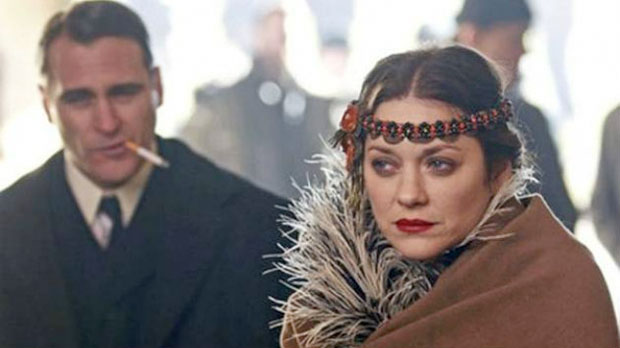 Back to selection
Back to selection
James Gray Blasts Film Critic Peter Bradshaw Over Immigrant Review (and Bradshaw Responds)
 James Gray and Peter Bradshaw
James Gray and Peter Bradshaw At the Marrakech International Film Festival, American director James Gray fired a broadside at British critics who reviewed his new film, The Immigrant, out of the Cannes Film Festival, singling out the much-respected and acclaimed film critic of The Guardian, Peter Bradshaw. Speaking to a group of international journalists on a roundtable he called The Guardian review, “The dumbest review I’ve ever read.”
Without referring to Bradshaw by name, but citing the review extensively, he called Bradshaw, “a failure as a critic,” and “corrupt.” Gray turned on British critics when he was asked by Finnish journalist Kalle Kinnunen about the mixed reaction to his film out of the Cannes Film Festival. Given the nature of his criticism, about journalists getting the facts wrong, Gray’s statement is set out in full.
Gray responded, “The reviews out of Cannes were the best that I’ve ever gotten out of Cannes from the United States, the American critics were extremely good to the film and then it played in New York in October and the reviews were excellent. If you are talking [about] mixed [reviews], then you are probably talking about the world.
“You know if everybody loves the film then there is really something quite wrong with it. If everybody loves it, it’s sort of a crowdpleaser in a way; it’s never been my view of what a good piece of cinema, or a good piece of art – if I may use that word – is. At least upon initial release. What has to happen, is the movie has a life, or the work of art, in this case I’m using the word loosely… It has to mature over time and then over two, three or four years you begin to see what it is. With movies, there is sort of a rush to judgment.
“I saw it myself, when I was in Cannes. I had a magnificent head of the jury, Isabelle Huppert was fantastic, you can’t, and she talked about it as well, there is always a rush to judgment over movies, particularly in Cannes and you are hostage or beneficiary of the context in which the film is shown. What time of the morning, what film was shown the night before, and what is the theme of the festival. This kind of nonsense, which doesn’t exist anywhere else years later, you don’t know that sort of thing. Every film that I have made has got that kind of reception in Cannes, and then 4 years later, people write me a letter or something, ‘I was wrong, I thought it was great’.
“Do I take it personally? Of course I do. This year I tried to read as little as possible, but the publicist did send me some reviews, particularly out of the UK, which I found gallingly dumb. It’s hard to read a review, which you think is flat out dumb and not take it personally.”
I then asked Gray what he thought was dumb about my countrymen and fellow critics. It was then that he made his astonishing attack on The Guardian’s film critic: “Any argument can be made for and against the virtues of the film, but in particular The Guardian’s review was one of the dumbest reviews I’ve ever read. He spoke at length about how the film went south once I staged a preposterous scene where Caruso sings for the immigrants, which is actually the recreation of an actual event.
“If you are going to make a criticism of a movie and the main focus of your criticism is how dumb I am for staging a scene, you better get your facts right, which he didn’t. The other thing is, he wouldn’t be expected to know that, except it was in the press notes. So he was not only dumb, but lazy.
“His job, he has no real obligation to like or dislike a film, to be right or wrong in terms of history. He can say anything he wants, but he cannot be wrong about the facts. You can argue any opinion. I cannot say that 2 plus 2 is 7, I can’t do that; that is not good criticism. So I thought he is a failure as a critic. His job is to educate the reader, so he is actually corrupt and doing a disservice to the readers by telling them that something never happened when it did.
“After reading that, I was so disgusted that I stopped reading them. One of the others I saw said my dialogue was bad, and then quoted a line that was never in the movie. When you see that sort of thing, then you know that they hated the movie before it started, they wanted to hate it, they said this guy, we hate his movies, forget it.
“So I take that personally, because you struggle to make a film and there are so many things that you have to deal with, so many things that you are trying to do, and you would hope that the film would be discussed on at least some level that you intended, either good or bad. I’ve read bad reviews of my film, and felt, ‘Oh, they have a point’, you know and there is something interesting about that, that has value.
“But on this movie, I didn’t see that, particularly out of the U.K. I’m sure if they read this, they will fight back with great virulence, about what an idiot I am, but I’m right about the facts and they can’t argue that. There were some very good critics out of the U.K. who hated the film, so maybe it’s just something that is cultural, or maybe the movie just stinks.
“My own view is that it’s impossible not to take it personally, and I try to read as few reviews as possible. In a way, you can’t avoid it. The publicist either sends them to you and you don’t read them, or someone tells you. In the case of The Guardian, my production designer was so enraged, because he had spent all this time trying to make that concert as accurate as possible, get all the details right, recreate it precisely, and then to have that said, he was apoplectic. [He said,] ‘You have to read this, you have to read this’, [and] that is why I read that one.”

The offending paragraph appeared in Bradshaw’s review in The Guardian on Friday May 24, 2013:
Everything about the way The Immigrant has been furnished and designed shows how genuinely concerned Gray is to make his film authentic. Yet, having exhaustively established that Ellis Island is a tough place and its officers tough people, Gray asks us to believe that it would lay on a lavish theatre show to entertain its hospital patients – starring Caruso, no less! Fancy society folk in Manhattan pay an awful lot of money to hear Caruso, and his fee must presumably be huge. Would the Ellis Island authorities really pay that kind of cash to entertain the poor immigrants? Or would Caruso do it for nothing?
Gray’s argument that the job of the critic is to “educate the reader” is a rather academic approach to criticism and one at odds with the realities of reduced word counts and the rush to get reviews out quickly to sate the demands of the Internet. In the age of star-ratings, many people think the critic’s job is to inform or make an argument about whether a film is any good or not. What is the role of the critic in the Internet age is a question that is continually being discussed.
To cast the job of the critic in such a well-defined box ignores the realities of today’s commercial market and the many different demands, from the media and audiences that critics have to cater for. Bradshaw is writing for a national newspaper, not a film magazine claiming to be a journal or record, or the final word on film. My bet is that his editor thinks his job is to provide good copy, while providing arguments on the merits of a film, whether good or bad.
As for Bradshaw getting the facts wrong, Gray may also get pulled up here. There are two ways to read this segment, the first — and this is the way Gray seems to have read the article — is that Bradshaw questions whether the event actually took place in reality. However, to read the review in this manner ignores the fact that Bradshaw at the start of the paragraph in question clearly states and actually praises Gray for his “genuine concern… to make his film authentic.” Bradshaw’s criticism seems to me to be that the film makes a huge narrative jump that doesn’t make sense within the context of the story as set up by Gray when we see Caruso’s concert.
Bradshaw argues that Gray does not adequately explain why the authorities would suddenly get Caruso to sing on Ellis Island. Bradshaw even seems to be demanding more facts from the film, not less. He wants an explanation as to why the authorities, supposedly “tough people,” would seem to go against their nature by paying “that kind of cash to entertain the poor immigrants,” or “would Caruso do it for nothing?”
Read this way, it seems that Bradshaw’s problem is that Gray hasn’t iterated the facts sufficiently clearly enough that a viewer who hasn’t spent the months, or years, researching the period, could understand why Caruso is performing on Ellis Island. Whether the event happened in reality or not, is moot.
I took particular umbrage at Gray’s claim that a critic should have known the facts about the concert by reading his press notes. I hardly ever read press notes, believing that a film should be able to explain itself and be coherent with what we see on screen. It’s not like the audience gets handed press notes when they see films at theatres. If a film needs supplementary reading to make sense, then perhaps the director hasn’t done his job properly, which seems to be Bradshaw’s argument.
Gray should be concerned that despite The Immigrant being factually accurate, the way he has told the story doesn’t seem “real.” The same is true of the dialogue.
But perhaps my argument in support of a colleague is just what Gray expects. After all he does state, “I’m sure if they [U.K. critics] read this, they will fight back with great virulence, about what an idiot I am, but I’m right about the facts and they can’t argue that.”
Here, Gray as he does throughout his argument, and he makes some good points, overstates his argument. Nobody in their right mind would call Gray an idiot. The opposite is clearly true and it’s refreshing to see a director make such a strong and impassioned argument over a review. His statement clearly shows that he feels that critics still have a relevance and importance, even as they are being reduced in number by media who can no longer afford to pay for culture reviews.

Gray is clearly right to criticize when journalist gets facts wrong. Although it’s understandable that this happens when critics are being asked to do a review within an hour of seeing the film. But how important is the fact of the Caruso concert to Bradshaw’s argument? Not really much at all. It’s also arguable that Bradshaw’s wording is vague enough to be read two ways.
On one reading, Bradshaw certainly gets his facts wrongs, and it’s understandable that filmmakers who feel slighted over a review would read the review in this way, and see an opportunity to attack the author. Bradshaw himself admits below that the statement reads like a fact, when he was actually arguing a point about the film.
As for whether Bradshaw as a critic had decided even before he went into the cinema that he was going to hate the film simply because it was directed by James Gray seems pretty preposterous, and knowing Bradshaw, I can vouch for his effort to give every film a fair chance, on its merits. Often, I disagree with his deductions and opinions, but not the willingness to give every film a fair chance.
I noted that Bradshaw in a 3-star review gave a mixed account to We Own the Night, he wasn’t a fan of Two Lovers, handing it 2 stars. It’s hard to believe that he came into the cinema so prejudiced against Gray that he would be determined to hate the film. I myself am a big fan of Two Lovers, but was not enamored by The Immigrant.
I spoke to Bradshaw about Gray’s comments and he acknowledges that there is a problem with how he presented the argument about the Caruso scene in The Immigrant. But Gray focuses on that and doesn’t credit Bradshaw for what is a studied and valid opinion. The Guardian critic states, “I have known and admired James Gray’s work for almost 15 years, ever since I met him in Cannes and saw his The Yards. In particular, I think We Own The Night is a fascinating film, which grows in the mind with re-watching.
“I apologize to him for the factual issue about Caruso and Ellis Island. He’s right: 2 plus 2 does not equal 7, though there is another critical point about the credibility of this scene within the dramatic context. However, James Gray is unquestionably a major talent and his future films at Cannes will be events that I will always look forward to.”
